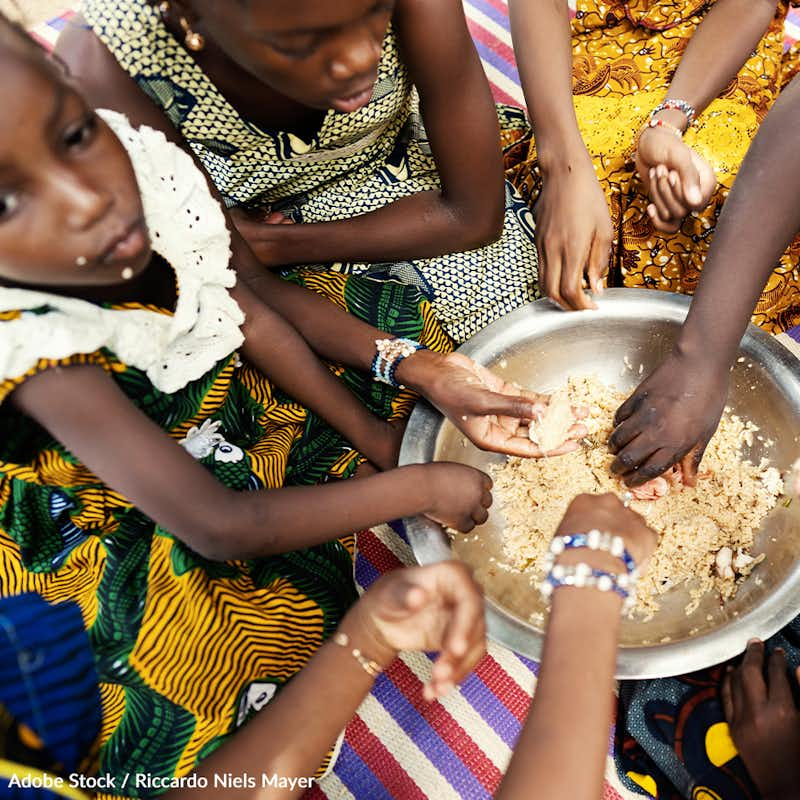Pledge to Help End World Hunger
7,208 signatures toward our 30,000 Goal
Sponsor: The Hunger Site
Hunger can have serious negative consequences for individuals, communities, and societies. Take the pledge to help reduce world hunger!

An estimated one in nine people globally suffer from hunger, and that number is only getting worse.
Before the COVID pandemic, 2018 was the third year in a row that number has increased, according to a United Nations report released July 15, 20191.
Since then, the impacts of ongoing regional conflicts, climate change, the COVID-19 pandemic, and the Russian-Ukraine war have drastically weakened the world’s already inadequate, unsustainable food systems. This confluence of factors has induced in supply chain disruptions and high and volatile prices for food, fertilizer, and fuel, and the result has been the third global food crisis in less than two decades. According to the 2022 Global Hunger Index (GHI), released in October by IFPRI, Concern Worldwide, and Welthungerhilfe, the world’s progress toward ending hunger has virtually stopped2.
Hunger and malnutrition have a negative impact on health. When people do not have access to enough food, they may experience malnutrition, which can lead to a wide range of health problems, including stunted growth, increased susceptibility to illness and disease, and even death3.
Hunger can have a negative impact on education and economic development. Children who are malnourished may have difficulty learning and may be less likely to attend school, which can have long-term consequences for their future prospects. In addition, hunger and malnutrition can limit economic development by reducing the productivity and effectiveness of the workforce4.
Hunger and malnutrition can contribute to social and political instability. When people do not have access to enough food, they may become frustrated and angry, which can lead to social unrest and conflict. This can have serious consequences for individuals, communities, and societies5.
Hunger is also a fundamental human rights issue. Everyone has the right to access to adequate food and nutrition, and it is important that we work to ensure that this right is protected for all people6.
Hunger affects millions of people around the world. It can have serious consequences for individuals, communities, and societies.
Overall, solving world hunger can help to improve health, education, economic development, and social stability. Take the Pledge and Help us Reduce World Hunger!
- E.P. Milligan, World Socialist Web Site (19 July 2019), "United Nations report finds global hunger on the rise for third year in row."
- Danielle Resnick, Klaus Von Grebmer, Jill Bernstein, Miriam Wiemers, Laura Reiner and Marilena Bachmeier, International Food Policy Research Institute (2022), "2022 Global hunger index: Food systems transformation and local governance."
- Cleveland Clinic (2022), "Malnutrition."
- UNICEF (November 2022), "Malnutrition."
- Patrick Webb, Gunhild Anker Stordalen, Sudhvir Singh, Ramani Wijesinha-Bettoni, Prakash Shetty, Science and Politics of Nutrition (13 June 2018), "Hunger and malnutrition in the 21st century."
- Food and Agriculture Organization of the United Nations (2022), "The Right to Food."
The Pledge:
Hunger affects millions of people around the world. It can have serious consequences for individuals, communities, and societies. Overall, solving world hunger can help to improve health, education, economic development, and social stability.
As such, I pledge to support the following tasks to help solve world hunger:
5. Support sustainable agriculture and food systems.
By supporting small-scale farmers, particularly in developing countries, we can help to increase food security and reduce hunger in the long term. This can be done through donations to organizations that work on these issues or by purchasing products from companies that support sustainable agriculture.
4. Reduce food waste.
Up to one third of all food produced in the world is lost or wasted. Reducing food waste can help to ensure that more people have access to the food they need. This can be done by planning meals carefully, using up leftovers, and composting food scraps.
3. Volunteer with organizations that address hunger and malnutrition.
Many organizations rely on volunteers to help with a wide range of activities, from distributing food to providing education and support to those in need.
2. Donate to organizations that work to end hunger.
There are many reputable organizations that work to provide food and support to those in need, both in the United States and around the world. Greater Good Charities is committed to both emergency hunger relief as well as providing opportunities for communities in developing countries with the tools for long-term, sustainable feeding and potential economic opportunities.
Through its programs and partnerships, GGC provides support for:
- Live-stock and seed programs for farmers in impoverished countries.
- Food assistance for disadvantaged & homeless veterans in America.
- Immediate food relief for impoverished children around the world.
- Programs that redistribute excess food from college campuses and into the hands of starving Americans.
You can help. Your support will provide immediate food relief and opportunities to break the cycle of hunger in the US and around the world.
1. Advocate for policies that address hunger and malnutrition.
By speaking out and advocating for policies that address these issues, we can help to raise awareness and bring about positive change.
This can be done through writing to elected officials, participating in letter-writing campaigns, and supporting organizations that work on these issues.
By taking these steps, I will be helping reduce world hunger, and bringing nutrition and stability to people around the world.
Pledged by,